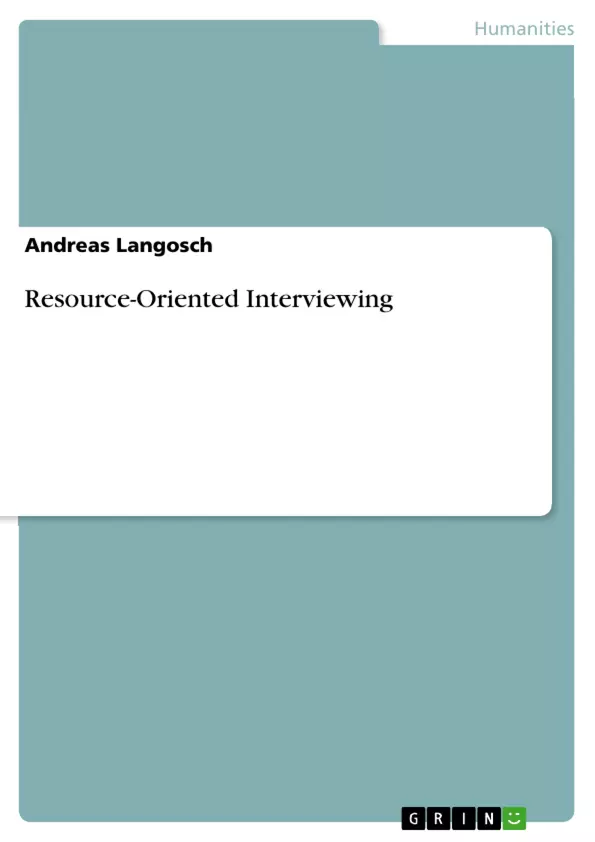Four questions are central to Resource-Oriented Interviewing. Every adult person has probably dealt with these questions in one way or another: 1. How do I promote resources, strengths and abilities? 2. How do I reduce or remove deficiencies? 3. How do I question goals as constructively and respectfully as possible? 4. How do I question ways and means as constructively and respectfully as possible? Resource-Oriented Interviewing gives realistic answers to these questions. It proves to be extremely pragmatic again and again. Resource-Oriented Interviewing in the form represented here has its origin in the area of help for alcohol addicts and was also applied in the sphere of psychiatric help, social integration and project management. Furthermore it can be used appropriately in many fields of working life and also in private contexts. Resource-Oriented Interviewing is the art of working in a resource activating way in a deficit-oriented context by using specific questions.
Inhaltsverzeichnis (Table of Contents)
- Introduction: What is Resource-Oriented Interviewing?
- The Principle of Feedback
- Topic No. 1: The Problem and Previous Coping Strategies
- The Questions
- Explanation
- Risks and Hazards
- Topic No. 2: Exceptions to the Problem
- The Questions
- Explanation
- Risks and Hazards
- Topic No. 3: Meaning and Purpose of the Aim
- The Questions
- Explanation
- Risks and Hazards
- Topic No. 4: Hoping to Accomplish the Goal
- The Questions
- Explanation
- Risks and Hazards
- Topic No. 5: The Feasibility of the Goal
- The Questions
- Explanation
- Risks and Hazards
- Topic No. 6: Individual Steps Towards the Aim
- The Questions
- Explanation
- Risks and Hazards
- Topic No. 7: The Evaluation of the Results
- The Questions
- Explanation
- Risks and Hazards
- Closing Remark
Zielsetzung und Themenschwerpunkte (Objectives and Key Themes)
This text aims to introduce and explain the principles and practices of Resource-Oriented Interviewing. It explores how this approach can be used to effectively address various challenges and promote personal growth.
- Identifying and utilizing individual resources, strengths, and abilities
- Reducing or mitigating deficiencies and obstacles
- Constructively and respectfully questioning goals and means
- Practical applications of Resource-Oriented Interviewing in different contexts
- The principles of feedback and its role in the interviewing process
Zusammenfassung der Kapitel (Chapter Summaries)
The text begins by defining Resource-Oriented Interviewing and outlining its core principles. Each subsequent chapter delves into a specific topic related to the interviewing process, such as identifying the problem, exploring exceptions to the problem, and defining the meaning and purpose of a desired outcome. Each chapter provides a structured approach with specific questions and explanations, along with potential risks and hazards to consider.
Schlüsselwörter (Keywords)
Resource-Oriented Interviewing, strengths-based approach, solution-focused, empowering, feedback, coping strategies, goals, individual resources, problem-solving, communication, constructive questioning, practical applications, alcohol addiction, psychiatric help, social integration, project management.
- Quote paper
- Andreas Langosch (Author), 2013, Resource-Oriented Interviewing, Munich, GRIN Verlag, https://www.grin.com/document/265215



